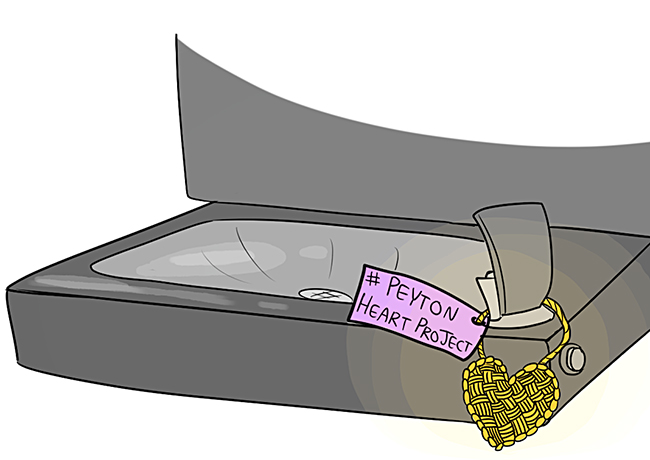When his dinner check arrives, UT alumnus David James slides a small, red hand-knitted heart in with his credit card. The heart reads, “The world needs you.”
The small knitted heart is one of thousands dispersed across 46 countries, each with a tag that reads #PeytonHeartProject beneath a positive message. The Peyton Heart Project, created by Jill Kubin, is named after James’ 13-year-old son, Peyton, who died by suicide last October. Kubin, who learned of James’ story online from her home in New Jersey, said the project intends to increase suicide awareness and spread the message that every life matters.
“It’s the little things that can make a big difference in people’s lives,” James said. “It doesn’t have to be a grand gesture — it can be something simple, like a little knit or crocheted heart.”
Followers of the project’s Facebook page scatter the handmade hearts in public places where they can be easily found — from bookstores to gumball machines. The Facebook page, which launched this summer, is a meeting point for heart knitters and dispersers. Kubin manages the page with James and facilitates the exchange between heart creators and distributors.
Laura Watkins-Benoit, an active knitter and North Carolina resident, said she knits hearts by the dozen, scattering them around Fort Bragg, the military base where she works. Although she doesn’t have a connection to James or Kubin, she said she was deeply touched after reading Peyton’s story online.
“I’m honored every time I put one of my hearts somewhere,” Watkins-Benoit said. “Every time I hang one of them up, I say a tiny little prayer for Peyton’s family because I really cannot imagine their anguish.”
People who find the hearts often visit the Facebook page and write posts detailing where they found the heart and how it made them feel.
“I found this beautiful heart yesterday at Whole Foods,” reads one of the Facebook posts, accompanied by a photo of a heart. “It deeply touched my heart and soul during a difficult time in my life.”
Although Kubin and James have never met, James said he calls her and her daughters his “angels from New Jersey.” In February, Kubin found James online because they were both involved with separate charity projects.
After reading his story, Kubin asked him if she and her eldest daughter could hold a hat drive in honor of Peyton to bring attention to the consequences of bullying. James agreed, and after the hat drive ended, Kubin presented him with The Peyton Heart Project idea.
“It is a really sad story, but it’s a really important one,” Kubin said. “It resonated with me like no other story had and I don’t really know why. I just felt like I wanted to do something to help get his story out there.”
Peyton, a lover of computers, jokes and “Doctor Who,” attempted suicide on Oct. 8, 2014. He battled depression, anxiety and bullying from his peers at school. On Oct. 13, after five days at the Dell Children’s Hospital, Peyton died.
“[Peyton] was just a bundle of energy,” James said. “He was a creative, inquisitive, smart and loving kid. He was the one who always wanted to make sure you were okay. If you dropped your notebook, he was the one who was going to stop in the hall and help you pick it up, no matter who you are.”
James said the day he received the phone call with the news of his son’s suicide, he considered lying to his co-workers because of associated stigmas, but he said something made him come forward with the truth, details and all.
“People are uncomfortable with [discussing suicide],” James said. “It’s an uncomfortable topic and people might not approach it because of that, but I was going to do it. Somebody had to.”
Correction: The Peyton hearts have been distributed in 46 countries.





















